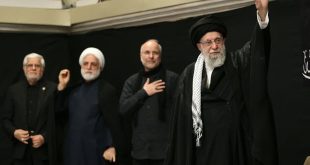This thesis examines the discourse of a contemporary Pakistani Shi‘i cleric, Syed Jawad Naqvi. It focuses on his sermon The Role of Women towards the System of Wilayat.
Like many prominent Shi‘i scholars, he studied in both Iraq and Iran. He also has met Ayatollah Khomeini, a very significant inspiration for some of his ideas.
This thesis, composed by Wendy Qian, links the concept of wilayat-i fiqh, governance of Shi‘i juridical authority or the Ayatollah, in relation to the heightened debates of political Islam in Pakistan and questions the natural alliance between Islamism and Pakistani nationalism through discussing Navi’s concept of wilayat.
The thesis starts with a brief account of the significant question of political legitimacy during the Mughal Dynasty and the waxing and waning ulema authority. It also introduces the colonial effects on religious publishing and examines how it affected sectarian relations and the political consciousness of certain Muslims in South Asia. The thesis then traces the sectarian contestations and the attempts to construct an overarching Islamic legal framework in modern-era Pakistan. Naqvi is responding to these historical concerns and to contemporary politics, namely, the 1979 Islamic Revolution that took place in Iran. While his rhetoric extends beyond borders at times, Naqvi hesitates to suggest a similar revolution for Pakistan.
This thesis situates Naqvi’s writing within the Shi‘i tradition both in South Asia and beyond. It examines the rhetoric of the politicians that laid the foundation for Pakistan’s state religion—Islam—as well as sermonizing rituals of the Shi‘is in South Asia to give context for Naqvi’s political style. It explains the fiery rhetoric of Naqvi by providing accounts of violent sectarian conflicts of the 1970s and 1980s in Pakistan. The intense level of violence exhibited by both state and non-state actors questions the nation state’s legitimacy and rhetoric of universalism. Finally, this thesis provides gender analysis of Naqvi’s sermon within the context of Islamic reform (tajdid) since late colonial South Asia. Similar to the writers of the colonial era, Naqvi posits women as potential agents for carrying out the revolution. He suggests pious Shi‘i women should adopt certain changes for a better societal foundation that could usher the arrival of the Hidden Imam and a truly just society. At the same time, Naqvi also advises them to fulfill domestic chores and duties. His sermon inherited characteristics from the late colonial era’s advice literature genre.

 Ijtihad Network Being Wise and Faithful Muslim in the Contemporary World
Ijtihad Network Being Wise and Faithful Muslim in the Contemporary World
